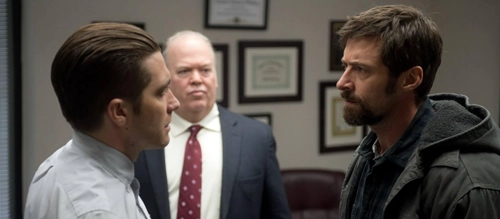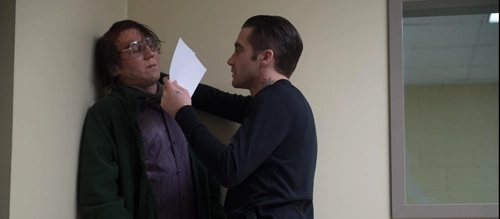‘Prisoners’ at 10 – Review

Prisoners (2013)
Director: Denis Villeneuve
Screenwriter: Aaron Guzikowski
Starring: Hugh Jackman, Jake Gyllenhaal, Viola Davis, Melissa Leo, Maria Bello, Terrence Howard, Paul Dano
Denis Villeneuve’s taut and gripping 2013 thriller Prisoners follows several characters in the aftermath of any parent’s worst nightmare: child abduction. When two young girls go missing on Thanksgiving, desperate father Keller Dover (Hugh Jackman) enlists the help of Detective Loki (Jake Gyllenhaal). After the prime suspect is released due to a lack of evidence, Loki is forced to take matters into his own hands, as the film explores how far humankind will go to protect the ones we love.
Hugh Jackman is utterly convincing as a despairing father, driven to the edge by an unforgivable act of evil. We feel his sense of urgency and utter desperation as he races against the clock to find his daughter and her friend. Gyllenhaal is great as a ruthless police detective, his own concealed rage simmering beneath a facial twitch, which grows more pronounced with frustration. He is scarily good at embodying anger behind a controlled façade, his carefully slicked-back hair falling loose during an explosive interrogation of a suspect.
Paul Dano is infuriating as the prime suspect who may or may not have information about the girls’ disappearance. Keller’s frustration at the man who clearly has learning difficulties is painfully palpable, as Dano’s Alex Jones refuses to offer any information despite the brutal violence he is subjected to.
Throughout the film, director Denis Villeneuve poses a thought-provoking question: can extreme violence ever be justified? During an interview at the Toronto International Film Festival, Villeneuve described Prisoners as “a movie dealing with fears and angers that we all have inside ourselves. It’s a moral conflict”. The film will likely divide viewers on how sympathetic a character Keller is, but his questionable interrogation methods clearly come from a place of desperation and grief. Villeneuve realistically and powerfully presents a range of reactions from the grieving families. From Jackman’s sheer rage, to the hopelessness and inertia of his wife (Maria Bello), Prisoners follows the director’s prior film Polytechnique (2009) in illustrating how there is no “correct” way to respond in the face of such tragedy.

The cinematography is perhaps the film’s most notable element, with the dark and oppressive lighting reflecting the bleakness of the subject matter. Iconic British director of photography Roger Deakins has since become a regular collaborator with Villeneuve, and his cinematography for this film received a well-deserved Oscar nomination. Jóhann Jóhannsson’s score is also essential in establishing the sombre mood, and punctuates the narrative with a weighty sense of dread and foreboding. Jóhannsson would go on to work with Villeneuve across subsequent releases Sicario and Arrival, earning BAFTA nominations for both.
The film’s labyrinthine plot is creatively reflected by the maze imagery throughout, and the story twists and turns throughout its 2-hours and 33 minutes with no dull moments. There are some truly chilling and heart-stopping sequences that remain impactful a decade on.
Prisoners marks Denis Villeneuve’s first English language film, previously receiving critical acclaim for his 2010 Middle Eastern drama, Incendies. He has now become a prominent figure in the modern sci-fi genre, making Blade Runner 2049 and Dune among others.
The way in which the film thought-provokingly tackles an impossible moral dilemma makes Prisoners a superior addition to the crime thriller genre. In keeping with the title, we are held captive throughout and remains in its grip long after the credits have rolled.
Score: 20/24
Written by Gala Woolley
You can support Gala Woolley in the following places:
Twitter – @GalaWoolley
Blog – screenqueens.co.uk

